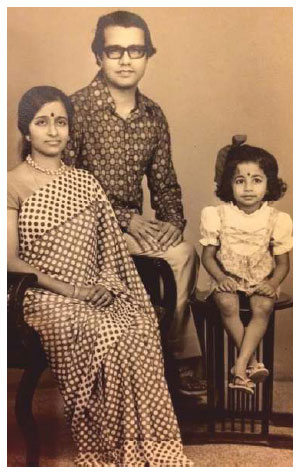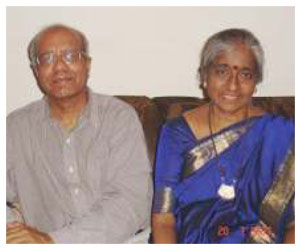Home / Newsletters / ITN 50 / Subscribe
Organ failure and transplantation - Perspectives of caregivers
Indian Transplant Newsletter.
Vol.16 Issue No.50. March 2017 - June 2017
Print ISSN 0972 - 1568
Online ISSN 3048 - 653X
Print PDF

Perspective of S.V. Venkatesan, husband of Late Malathi Venkatesan
My wife Malathi Venkatesan was an ordinary homemaker affected by kidney failure at the age of 46 years with no known reason. She was put on dialysis in 1993 and had a kidney transplant in 1995, the donor being a distant cousin. She had several setbacks before the transplant took place including a hepatitis C infection, three hernia surgeries, and a continuous low-grade fever suspected as TB. She survived all of these to have a transplant thanks to her fierce determination and sheer will to overcome odds with a fighting spirit. Malathi was a highly disciplined patient with regard to diet, exercise and medicines, and meticulous to the core. She was a caring mother and wife, and deeply attached to her brother and sisters, nephews and nieces. Malathi had a zest for life and loved to travel the world after her transplant. She organized the marriage of our daughter Aparna beautifully and memorably, and greatly assisted Aparna in her path as a mother and astrophysicist, helping with the birth of her two grandsons Narayan and Kailash after her transplant. Malathi did all this while never forgetting her spiritual roots by visiting Sri Ramanasramam regularly and attending spiritual talks.
My wife Malathi Venkatesan was an ordinary homemaker affected by kidney failure at the age of 46 years with no known reason. She was put on dialysis in 1993 and had a kidney transplant in 1995, the donor being a distant cousin. She had several setbacks before the transplant took place including a hepatitis C infection, three hernia surgeries, and a continuous low-grade fever suspected as TB. She survived all of these to have a transplant thanks to her fierce determination and sheer will to overcome odds with a fighting spirit. Malathi was a highly disciplined patient with regard to diet, exercise and medicines, and meticulous to the core. She was a caring mother and wife, and deeply attached to her brother and sisters, nephews and nieces. Malathi had a zest for life and loved to travel the world after her transplant. She organized the marriage of our daughter Aparna beautifully and memorably, and greatly assisted Aparna in her path as a mother and astrophysicist, helping with the birth of her two grandsons Narayan and Kailash after her transplant. Malathi did all this while never forgetting her spiritual roots by visiting Sri Ramanasramam regularly and attending spiritual talks.

Malathi was an extraordinary person while appearing very ordinary. She was a founder of the TANKER Foundation supporting dialysis to poor patients since 1993. Till the end she served as a trustee of TANKER, and was also involved with the MOHAN Foundation. Her fight with kidney disease gave her an enormous inner strength and the growth of TANKER Foundation was in no small measure due to her deep involvement with all their patients and her empathy with their concerns. She had a failure of the transplanted kidney in 2013 and had several near-death emergencies over the next three years, until she passed away in November 2015. Till the moment of her death, she was visiting TANKER patients and knew each one of them personally. She never failed to soothe them with kind words and supported them emotionally and financially till her end. Her life is a shining example of how to motivate poor patients to fight the disease with a Back-to-Life spirit, and, despite one's odds, how to lead a meaningful and fruitful life. In all her efforts she had an abiding faith in her Guru and Master Sri Ramana Bhagawan. She represented humanity at its best through a giving and selfless spirit. Malathi continues to inspire her close friend and family, her colleagues in TANKER and the MOHAN Foundation, and all who knew her.
Perspective of Aparna Venkatesan, daughter of Late Malathi Venkatesan
The Hindu scriptures say that to be born to wealthy parents is a rare birth taking many lifetimes, but to be born to spiritual parents is even rarer. I am one of those fortunate few.
I can genuinely say that my parents are amongst the most inspiring people I know. My mother Malathi Venkatesan was a multitalented deeply spiritual homemaker who volunteered for and championed many causes over her life. My father S. V. Venkatesan, now retired after a long successful corporate career, is a highly intelligent humble kind man exemplifying Vedic values. I share below what is merely my journey and perspective from a daughter of a person with CKD and renal failure. This may not be of value nor have validity for others.
My mother suffered from hypertension since her 30s and subsequently from kidney disease since her 40s. Her many travails over several decades written from the patient's perspective are beautifully chronicled in this article from The Hindu (2015), which elicited an outpouring of letters and emails from readers:
www.thehindu.com/opinion/open-page/open-page-kidney-disease-a-firsthand-view/article6993976.ece
My mother began experiencing kidney failure while I was in the US at Cornell University for college. Things steadily worsened through my 20's as she underwent several medical emergencies and hernias, finally stabilizing enough for a kidney transplant in 1995. As I did my doctorate in astrophysics at the University of Chicago, I frequently came back to India to care for her, and once took a longer leave to help her just before her transplant. After 1995, she had about 16 years of good health, which I now think of as our family's golden years. She was able to beautifully organize my wedding with my husband John with her characteristic thoughtfulness and generosity, and was a loving Paati to our two sons Narayan and Kailash. We shared many wonderful travels and memories. After 2011, her transplanted kidney began to slowly decline in function, with increasing complications. In 2012 she had a minor heart attack, right after I had received tenure, and in the first week of my sabbatical year. I immediately came home to take care of her for a few weeks, and to help her and my father through her stent operation. My father surprised her with some roses in her favorite colour (deep orange) when she entered the house and she was thrilled. Looking back, this was one of her happiest times I can recall in the last few years of her life. She felt hopeful for the future, a hope that didn't last long as her kidney degenerated and eventually failed, leading to 2+ years of dialysis and many further complications eventually leading to her passing in November 2015.
My mother's health had been a part of the landscape of my marriage from the start, as well as the relationship with my children. I was fortunate that my American husband was a loving Asian son from the start. There were some years when I was away frequently to care for my mother, sometimes for longer stretches of time. This certainly took a toll on everyone, especially the children, as I often missed summer vacations or holidays. I also took longer to complete each professional stage (my graduate degree, my postdoctoral path or academic promotions), and at times missed professional opportunities and conferences. But I've never regretted this and I've been grateful for the support from John and my children. Without this and the unceasing help from my in laws Gray and Mel Rueppel, I could not have been a caregiver for my mother nor offered support for my father.
Over the years, I came to realize a number of things from observing my mother's journey. When we are ill and suffer for a long time, it changes our perception of ourselves. It is not just our physical bodies that are injured, our sense of our self is itself injured. It is hard especially when a person who was so highly meticulous, self-reliant and fiercely independent as my mother becomes affected by a disease with no cure and no end. The patient begins to feel a loss of hope and the caregivers, whether spouses, children or other family/friends, feel a great helplessness watching all the suffering. All around, the strain is great and the toll is deep. I often drew consolation from Hindu spiritual teachings and from the Buddhist concept of “bearing witness”. This helped me with trying to practice loving presence and deep listening, rather than offering quick advice or being falsely upbeat with my mother.
We often hear the advice that “you must take care of yourself before you take care of others”. This is all too true, but orthogonal to the Indian worldview and often impractical as well. In some years when my mother's troubles were peaking, I had two young children, I was greatly expanding the astronomy program at the University of San Francisco while supporting my husband through law school, and was going up for tenure in my department. There was just NO way to take care of my children as well as my mother plus support my father, while putting myself first.
Owing to these realities, I did not hesitate to ask for help. This is hard for many people with a traditional Asian mindset, but it is key to maintaining enough personal health to survive the physical and mental strain of being a caregiver. I also learned to keep a disciplined distance from conversations or situations that compromised the physical or psychological well-being of my parents or myself, as it was a vulnerable and fragile time for us.
As an aside, my mother received great medical care, but I often found myself wishing there was more psychological support formalized in the Indian medical system itself, e.g., more counselling for the patient and their spouse for making tough decisions, when to hire professional at-home care, or even just how to survive the ongoing drama and strain of a prolonged illness. This counseling is even more important after the loved one passes – the loss of a parent or spouse is a watershed moment for which, even when anticipated, we are often not prepared. Having trained professionals who can discuss end-of-life care an decisions with family members would be a great help too.
Through all our difficult times, we tried to have as much fun together and heal through laughter, as well as celebrate as many occasions and birthdays together. We now cherish these memories. When my mother passed in 2015, we performed her cremation and rites around Diwali that year (which coincided with my birthday). It was painful but I was so grateful for having known such a great woman and wonderful mother who was now freed from her physical suffering, and to have had the opportunity to serve her. After one of my caregiving visits in recent years, my mother said that I had done my duty to her in this lifetime and that I can be at peace. These are words I still use to console myself. As the Buddhist monk Thich Nhat Hanh says, “There is no way to peace. Peace itself is the way.”
Available at:
https://www.itnnews.co.in/indian-transplant-newsletter/issue50/Organ-failure-and-transplantation-Perspectives-of-caregivers-537.htm
- Copyright © 2025. Published by MOHAN Foundation
